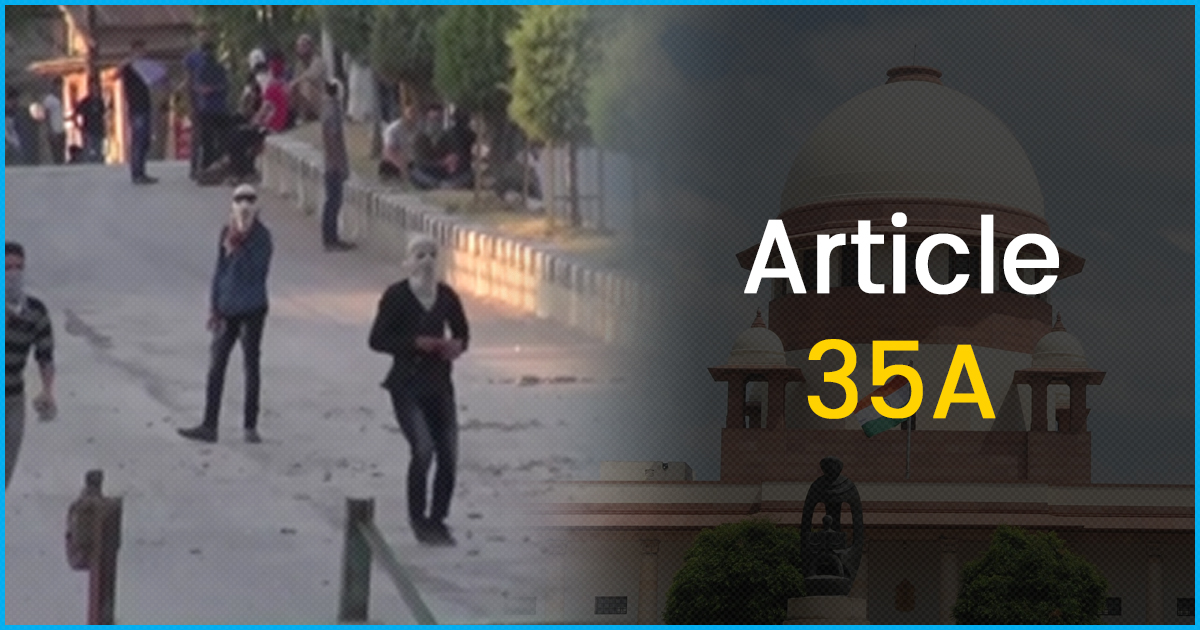
SC Adjourns Hearing On Plea Against Article 35A, Unrest In Valley Over Rumour Of Scrapping It
28 Aug 2018 7:40 AM GMT
The Supreme Court on August 27 adjourned its hearing on a plea which had challenged the validity of Article 35A. Article 35A is a provision which empowers the Jammu and Kashmir assembly to define “permanent residents” of the state, thereby bestowing special rights and privileges on them.
The three-judge Bench comprising of Chief Justice Dipak Misra, Justice AM Khanwilkar and Justice DY Chandrachud decided to adjourn the case because the petitioner had sought for adjournment of the plea.
The Plea
Delhi BJP leader and lawyer Ashwini Upadhyay had sought for a direction to the central and state governments to declare Article 35A of the Constitution as “arbitrary” saying that it was contrary to fundamental rights.
As reported by Live Law, Upadhyay said the article was in violation of Articles 14,15, 16,19 and 21.
In the recent past, two similar petitions have been filed. NGO, We, the Citizens and advocate Char Wali Khanna had come up for hearing on August 6. The Chief Justice had then adjourned the hearing to August 27, saying that there may be no further hearing over whether Article 35A is violative of the Constitution of India.
Tense atmosphere in J&K
Due to several rumours floating around the scrapping of Article 35A, the atmosphere in many parts of Kashmir was rather tensed on Monday. Several parts saw absolute shutdown and some places like Anantnag and in the Safakadal area even witnessed clashes between civilians and security forces. Youths pelted stones at security personnels.
A police official told The Times of India, “Shops and other business establishments, which had opened this morning, downed shutters after rumours of Article 35A being scrapped spread like wildfire and were circulated on social media.”
Text of Article 35A
Notwithstanding anything contained in this Constitution, no existing law in force in the State of Jammu and Kashmir, and no law hereafter enacted by the Legislature of the State:
- defining the classes of persons who are, or shall be, permanent residents of the State of Jammu and Kashmir; or
- conferring on such permanent residents any special rights and privileges or imposing upon other persons any restrictions as respects:
- employment under the State Government;
- acquisition of immovable property in the State;
- settlement in the State; or
- right to scholarships and such other forms of aid as the State Government may provide, shall be void on the ground that it is inconsistent with or takes away or abridges any rights conferred on the other citizens of India by any provision of this part.”
How did it come about?
Before 1947, J&K was a princely state under the British Paramountcy. The people of the princely states were not British colonial subjects but “state subjects”.
Article 35A was incorporated into the Constitution in 1954 by order of the then President Rajendra Prasad on the advice of the Jawaharlal Nehru Cabinet.
Following the accession of Jammu and Kashmir to the Indian Union on October 26, 1947, the Maharaja, Hari Singh, ceded control over defence, external affairs and communications to the Indian government. The Instrument of Accession and Article 370 of the Constitution of India formalised this relationship.
Discussions for furthering the relationship between the state of J&K and the Union led to the 1952 Delhi Agreement. Here, the governments agreed that Indian citizenship would be extended to all the residents of the state, but the state would be empowered to legislate over the rights and privileges of the state subjects – who would now be called permanent residents.
In his statement to the Lok Sabha on the Delhi agreement, Prime Minister Jawaharlal Nehru said:
“The question of citizenship arose obviously. Full citizenship applies there. But our friends from Kashmir were very apprehensive about one or two matters. For a long time past, in the Maharaja’s time, there had been laws there preventing any outsider, that is, any person from outside Kashmir, from acquiring or holding land in Kashmir. If I mention it, in the old days the Maharaja was very much afraid of a large number of Englishmen coming and settling down there, because the climate is delectable, and acquiring property. So although most of their rights were taken away from the Maharaja under the British rule, the Maharaja stuck to this that nobody from outside should acquire land there. And that continues. So the present Government of Kashmir is very anxious to preserve that right because they are afraid, and I think rightly afraid, that Kashmir would be overrun by people whose sole qualification might be the possession of too much money and nothing else, who might buy up, and get the delectable places. Now they want to vary the old Maharaja’s laws to liberalise it, but nevertheless to have checks on the acquisition of lands by persons from outside. However, we agree that this should be cleared up. The old state’s subjects definition gave certain privileges regarding this acquisition of land, the services, and other minor things, I think, State scholarships and the rest.
So, we agreed and noted this down: ‘The State legislature shall have the power to define and regulate the rights and privileges of the permanent residents of the State, more especially regarding the acquisition of immovable property, appointments to services and like matters. Till then the existing State law should apply.”
Debates surrounding Article 35A
A petition currently being perused by the apex court argues that Article 35A is against the “very spirit of oneness of India” as it creates a “class within a class of Indian citizens”. Restricting citizens from other States from getting employment or buying property within Jammu and Kashmir, the petitioner argues, is a violation of fundamental rights under Articles 14, 19 and 21 of the Constitution.
Another controversy is the constitutionality of 35A. Article 368(1) of the Constitution empowers only Parliament to amend the Constitution.
But the Nehru government did not place the adoption of Article 35A before Parliament. Did the Executive, therefore, act outside their jurisdiction? A reading of Article 368(1) affirms this. However, does the bypass of the Parliamentary route to amend the Constitution automatically nullify 35A?
Did the President act outside their jurisdiction? Article 370(1) says, “The President may apply the provisions of the Constitution of India to the State of J&K with such exception and modification as he may by order specify.”
Here, does the phrase “modification” include the power to amend the Constitution or to add a new Article to the constitution – like 35A, as had happened in 1954?
A five-judge bench of the Supreme Court in its March 1961 judgment in Puranlal Lakhanpal vs. The President of India discussed the President’s powers to amend the Constitution. In this case, the apex court observed that the President could modify an existing provision in the Constitution under Article 370. However, whether the President can introduce a new Article altogether is still debated.
Also Read:
TLI Explains: SC Adjourns Hearing On Article On 35A; Know What 35A Is
Govt Requests SC To Stall Hearings On Article 35A; Know What 35A Is About
 All section
All section













